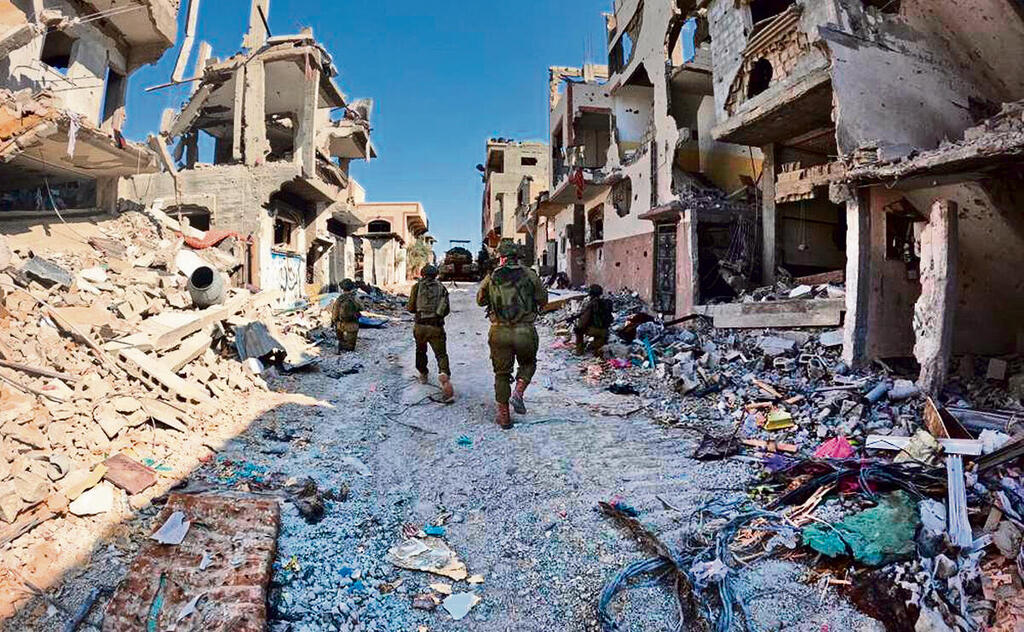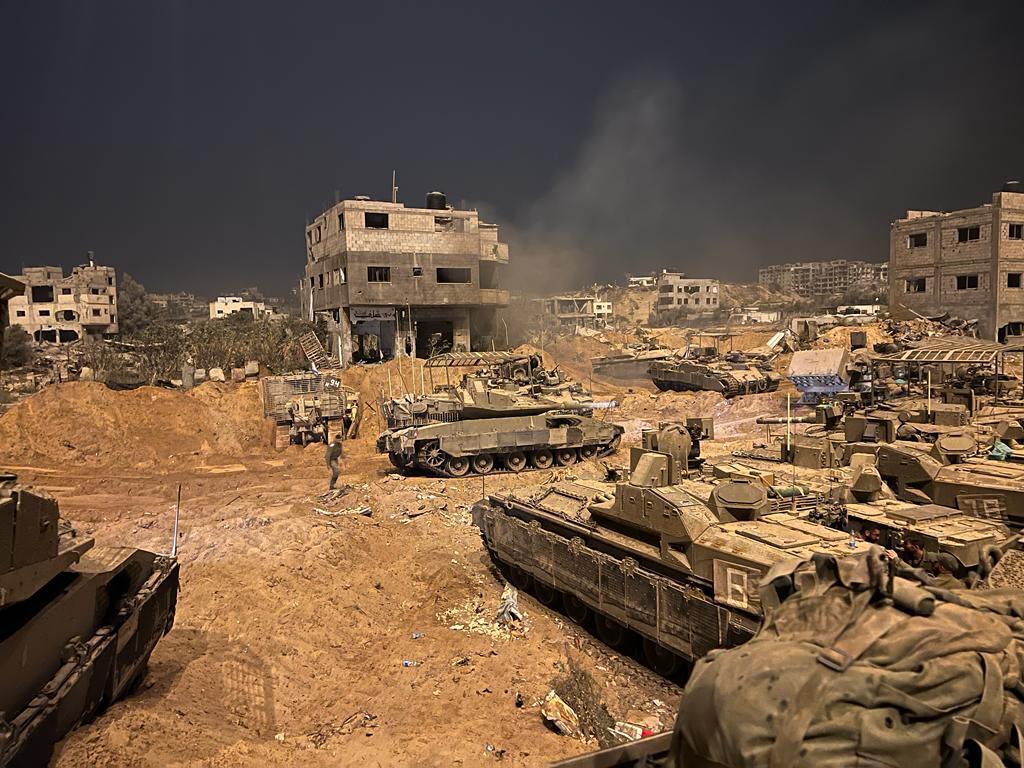On Tuesday, at the end of the fourth day of ground operations in northern Gaza, the fog of war gradually lifted. Encirclement and, perhaps, dismemberment - these are the two terms that summarize this stage of warfare. Gaza and its residents are effectively besieged; a security belt was created around them, intended to prevent the entry of people and supplies from outside and to allow exit only through corridors defined by the Israel Defense Forces. This is the new Gaza envelope - tightening, squeezing and pressuring.
Read more:
Southward to Gaza City, it seems that the attrition is turning into a siege: Gaza's riverbed separates the northern Strip from its center, and there's no coming or going. Plans for a full-scale siege of Gaza were also raised in previous rounds of fighting and for various reasons were not carried out. They were implemented this time.
Unlike previous rounds, this is a deep incursion, not just into agricultural areas and the outskirts of the built-up area, but into populated neighborhoods. The cost in soldiers' lives is heavy, very heavy. Israeli society can withstand it, but it will stand only if it knows that there is a purpose to this cost, that behind the military effort and the blood of the soldiers there is a solid, achievable, practical plan.
The IDF's significant advance has set the stage for new circumstances, leading to several possible outcomes. One possibility is that Hamas might lose control and collapse, leading to white flags flying over the remaining homes in Gaza City and chaos spreading. On the upside, you could say the main objective of the war has been reached. But on the downside, 240 Israeli hostages could be abandoned. This scenario is still a ways off – Hamas isn't falling apart just yet. However, there are those in the military who see this risk and are preparing for it.
Another scenario is that Hamas leader Yahya Sinwar and other Hamas leaders could be taken out. A third scenario is that the area under siege could experience a humanitarian crisis, leading to diplomatic pressure from the Biden administration and the international community to stop the operation.
A fourth scenario could be that, once the takeover of Gaza Strip is complete, the main force could stall. From past experiences, Israel finds it challenging to conduct a war of attrition like this one. The term "attrition" will start to be used a lot. Soldiers might start to grumble. And people back home might have a hard time hearing news about soldiers being killed.
This war has started differently from any other in Israel's history. The public's trust in the military leadership is at an all-time low, with only half of the population supporting the military and a mere 7% backing the prime minister's military leadership. An extended war on the outskirts of Gaza is the last thing anyone in Israel wants.
Let's talk about humanitarian aid. The violence against the Gaza border communities has hardened the military leadership's stance, which is quite understandable. The decision to provide humanitarian aid is not because of empathy for the Palestinians' plight in the Strip, but rather a strategic move. It's about buying time and gaining legitimacy and support from the U.S. administration. Providing food, water and medical supplies extends the timeline for the war to root out Hamas.
Politicians like Itamar Ben-Gvir, known for their reckless attitudes, fail to see this bigger picture. They would risk national interests for a catchy headline. The current humanitarian aid is insufficient and delayed due to practical constraints and logistical capabilities. It's in Israel's interest to ramp up aid swiftly. There are ongoing discussions with France and Egypt to establish a field hospital near the border on the Egyptian side, offering 200 beds. An additional 200 beds could be provided by a hospital ship. While it's uncertain whether this would persuade the administrators of Shifa hospital in Gaza to relocate the hospital further south, it would certainly buy Israel more time and legitimacy.
The U.S. and Israel do not have conflicting interests on the humanitarian issue, except for one thing - fuel. IDF spokesperson Daniel Haggai said in English that Hamas has large amounts of fuel stored in its tunnels, his target audience was the White House. He aimed to convince the Americans that Gaza is not facing a fuel shortage.
Yet, much like Israel, the U.S. also has to navigate political limitations. Biden's unambiguous backing of Israel might have earned him temporary admiration among Israeli leaders, but it negatively affected his popularity back home, a year before US elections. His seemingly warm relationship with Israelis and his promises of substantial aid didn't sit well with the progressive faction of the Democratic Party.
Consequently, the Biden administration has grown more attentive to the human rights situation in Gaza. It has also reacted more strongly to incidents of violence by Israeli settlers against Palestinians in the West Bank. The U.S. has been stepping up pressure for a hostage deal, exerting influence on both Qatar and Israel.
Israel is more dependent on America now than ever before, but nothing is free. For instance, the White House has insisted that Israel restore internet services in Gaza. While the internet isn't a panacea - often, it's quite the contrary - American media was vocal about their inability to operate, and the White House needs the media on its side.
It's mainly Qatar and Egypt that are speaking directly to Hamas about hostage deals, together and independently. Both have their national interests to serve. Qatar's motivation stems from its desire to cement itself as a global player, immune from criticism, by serving as an effective negotiator between the Biden administration and Hamas.
Egypt's concerns are more territorial in nature, as they are wary of hundreds of thousands of Palestinian refugees streaming from the enclave, hoping to call Egypt their new home. Egyptian President Abdel Fattah el-Sisi is less than thrilled with that prospect, so he offered to send the refugees into the Negev region of Israel, which doesn't sit well with either Netanyahu's coalition or his opposition.
The mechanism upon which these diplomatic efforts are conducted works as follows: The US envoy presses the Qatari premier, who in turn pressures the Hamas faction that is located in Qatar, which in turn pressures Hamas in Gaza. This process helps soften Sinwar, which can additionally be attributed to Israel's ground offensive that digs deeper and deeper into the enclave with every passing day.
Mossad chief Dadi Barnea was dispatched to Qatar, since he is part of the team designated with handling the hostage retrieval issue. On a separate plane landing in Doha was Yossi Cohen, a cabinet member assigned by Netanyahu, but perhaps arriving in Qatar without Netanyahu's knowledge. To keep things kosher, the Israeli premier said Cohen arrived by chance, simply because he wanted to visit. Nobody bought that.
So far, Israel is behind on three crucial parameters - time, money and legitimacy. The first phase of Israel's war was comprised of collecting the broken pieces brought about by Hamas' massacre, and moving to aerial assault mode.
The second is the ground offensive, which is well under way. The third is rebuilding governance inside the enclave, sans Hamas. As far as I can tell, the government has no plan in that regard, nor can it explain how phase two leads to phase three. This is the part the Biden administration is most wary of: How to restore governance and prevent a full-blown humanitarian catastrophe.
Netanyahu's approach to military operations has always been characterized by long, procedural and inconclusive discussions. This pattern continues today, possibly even more pronounced than before. Embroiled in a leadership confidence crisis, Gallant has chosen to construct his own team. The chief of staff appears to be perpetually caught up in discussions rather than calmly and clearly engaging in operational ones. This behavior seems to be mirrored by his fellow senior IDF officials.
The press conference called by Netanyahu, also featuring Yoav Gallant and Benny Gantz, had intended to include IDF Chief of Staff Herzi Halevy to join, positioned at the table with his back to the flags. This was a request from the Prime Minister's Office, but it was declined by the IDF. The chief of staff graciously declined this honor. Chances are, this is not a decision he looks back on with regret.






